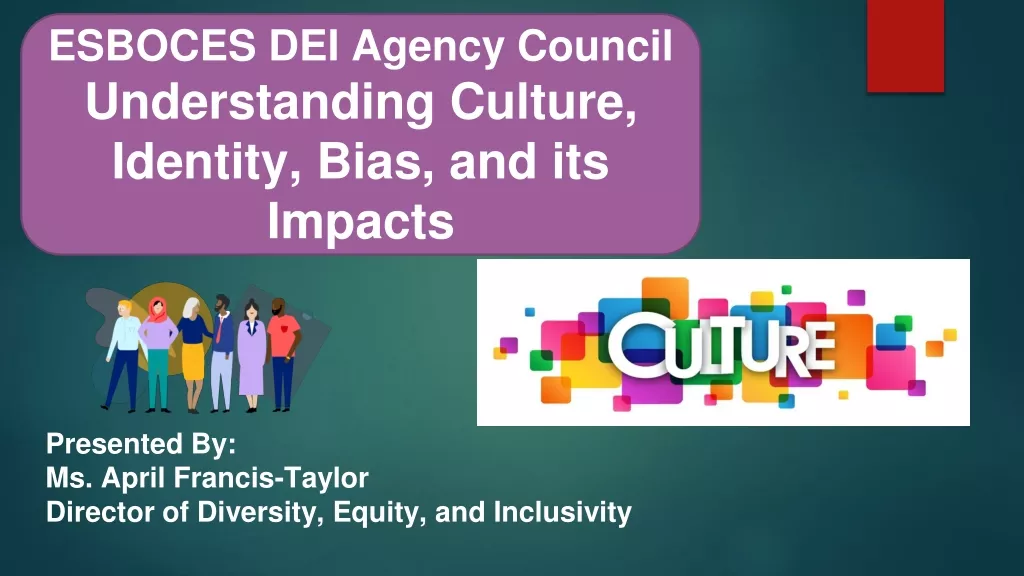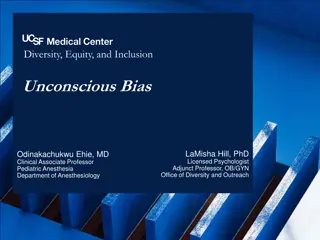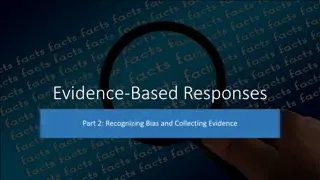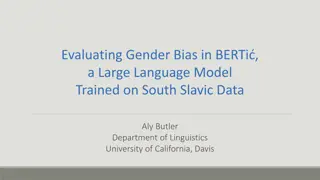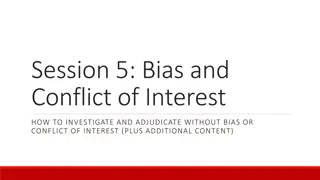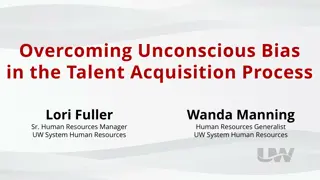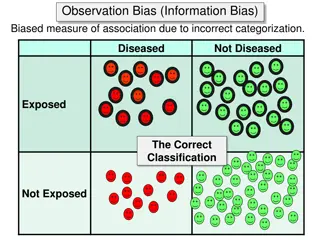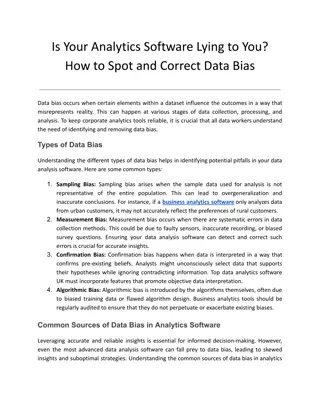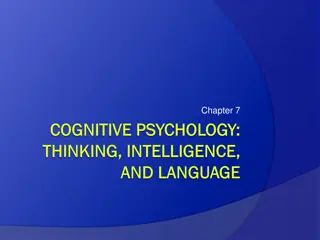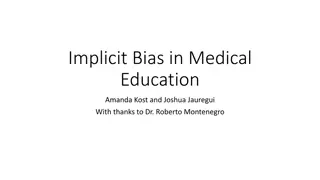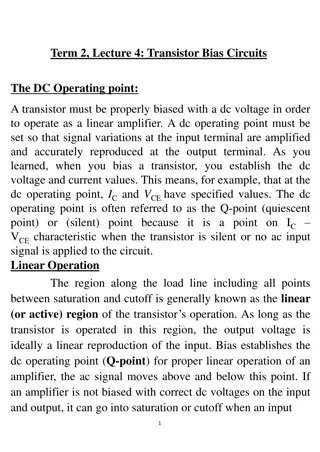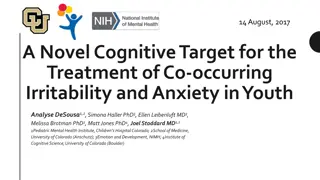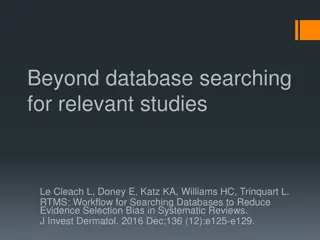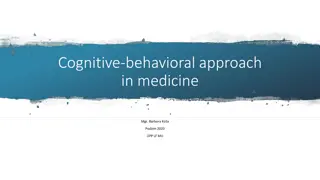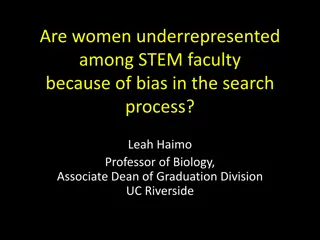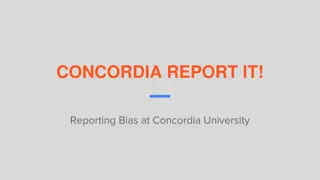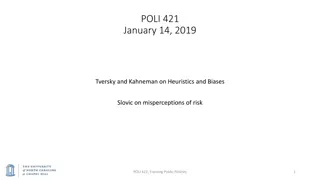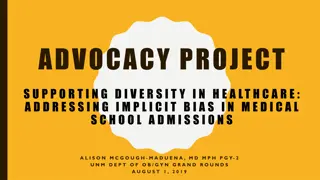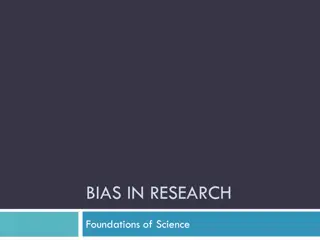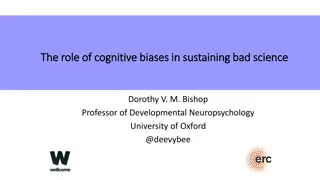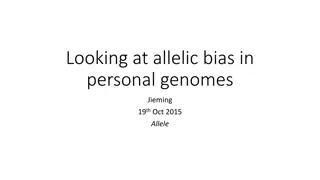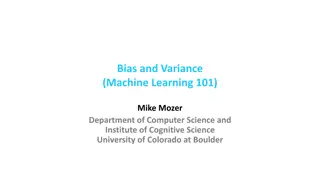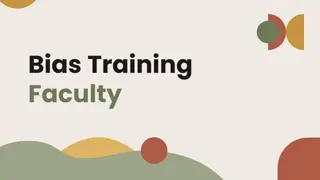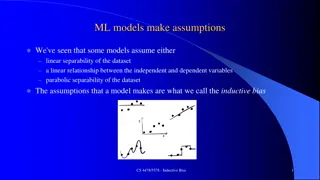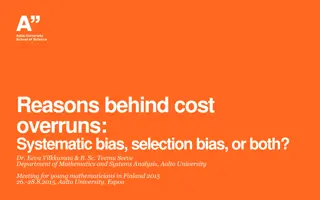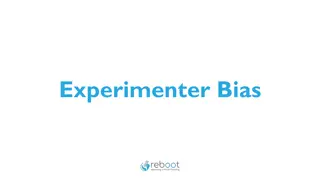Understanding Culture, Identity, Bias, and Diversity in the Workplace
This presentation highlights the importance of understanding culture, identity, bias, and their impacts in the workplace. Through courageous conversations and diversity training, participants learn to unpack implicit bias, combat bias, and develop teamwork skills. The session emphasizes staying enga
0 views • 19 slides
Unconscious Bias
Delve into the realm of diversity, equity, and inclusion through an interactive workshop focused on understanding unconscious bias, reducing bias in a safe space, intentional application in clinical settings, and successful interactions with diverse colleagues and patients. Engage in thought-provoki
1 views • 29 slides
Understanding and Avoiding Bias in Evidence-Based Responses
Recognizing bias in oneself and others is crucial when collecting evidence. Different types of bias, such as confirmation bias, can influence decisions and behaviors significantly. By exploring our own thinking and accessing curated resources to learn about bias, we can develop a deeper understandin
1 views • 14 slides
Brain Mineral Deposition and Cognitive Decline Study
Investigating the progression pattern of brain mineral deposition as a differential indicator of cognitive decline in individuals with varying cognitive statuses from normal to Alzheimer's disease. The study aims to develop improved imaging techniques and specific cognitive-relevant atlases to under
4 views • 24 slides
Evaluating Gender Bias in BERTi: Insights on Large Language Models
This study delves into gender bias evaluation in BERTi, a large language model trained on South Slavic data. It explores issues in language modeling, the impact of social biases in artificial intelligence, and training processes of Large Language Models (LLMs). Additionally, it discusses how LLMs le
11 views • 16 slides
Recognizing Hidden Bias in the Workplace
In the workplace, hidden bias, also known as implicit bias, can significantly impact hiring, employment decisions, and overall workplace dynamics. Deloitte's 2019 State of Inclusion Survey revealed that a substantial percentage of workers experienced bias at least monthly. Hidden biases can be based
3 views • 18 slides
Investigating Bias and Conflict of Interest: Guidelines for Fair Adjudication
Explore the intricacies of bias and conflict of interest in investigations, learn how to identify and counteract them to ensure fairness in decision-making. Topics include understanding bias, detecting it, LGBTQ terminology, evidence collection, and remedial actions like recusal. Navigate the nuance
0 views • 21 slides
Overcoming Unconscious Bias in Talent Acquisition Process
Overcoming Unconscious Bias in Talent Acquisition Process emphasizes the importance of addressing unconscious bias in hiring practices through awareness and control. The content delves into defining unconscious bias, its impact on diversity, examples, and strategies for managing bias. The University
0 views • 19 slides
Understanding and Utilizing Bias in Legal Proceedings
Exploring the complexities of bias in legal settings, this content provides insights on identifying, addressing, and leveraging bias in litigation. From defining various forms of bias to strategies for cross-examination and case presentation, it equips legal professionals with practical knowledge to
0 views • 19 slides
Types of Bias in Epidemiological Studies
Bias in epidemiological studies can arise from misclassification of observations and exposures, leading to incorrect associations between variables. Observation bias, misclassification bias, and non-differential misclassification can impact the accuracy of study results, either minimizing difference
1 views • 11 slides
Understanding Cognitive Testing in Aging: A Vital Assessment Tool
Cognitive testing plays a crucial role in assessing cognitive abilities and distinguishing normal aging from disease states in older adults. This program, a partnership between OneWorld and UNMC's Geriatrics Workforce Enhancement Program, highlights the importance of cognitive testing, its objective
0 views • 17 slides
Understanding Diode Junction Biasing: Zero and Forward Bias Conditions
In the world of electronics, diode junction biasing plays a crucial role. This article delves into the concepts of zero and forward bias conditions for diodes. When a diode is zero-biased, no external potential energy is applied, while in forward bias, a specific voltage is introduced to initiate cu
0 views • 21 slides
Is Your Analytics Software Lying to You_ How to Spot and Correct Data Bias
Data bias can distort your analytics and lead to misguided decisions. In this blog, learn how to identify common signs of data bias, understand its impacts, and explore effective strategies to correct it. Enhance the accuracy and reliability of your insights with practical tips and advanced tools, e
3 views • 8 slides
Understanding Cognitive Psychology: Thinking, Intelligence, and Language
Cognitive psychology explores the processes of thinking, intelligence, and language. It delves into mental activities such as organizing information, problem-solving, and forming concepts. Concepts like superordinate, basic level, and subordinate concepts are discussed alongside problem-solving meth
0 views • 37 slides
Understanding Implicit Bias in Medical Education
Delve into the origins, forms, and manifestations of bias in clinical and medical education settings. Learn strategies to mitigate and address bias through a detailed exploration of terms like System 1 and System 2 thinking, implicit bias, race/racism, sexism, microaggressions, and more. Gain insigh
6 views • 27 slides
Cognitive Stimulation Therapy in Post-Acute Care: A Pilot Study
Cognitive Stimulation Therapy (CST) is an evidence-based group intervention designed for individuals with mild to moderate cognitive impairment. It aims to enhance cognitive functioning through various activities such as executive functioning tasks, multi-sensory stimulation, and reminiscence work.
0 views • 9 slides
Understanding Transistor Bias Circuits for Linear Amplification
Transistor bias circuits play a crucial role in setting the DC operating point for proper linear amplification. A well-biased transistor ensures the signal variations at the input are accurately reproduced at the output without distortion. Various biasing methods such as Voltage-Divider Bias, Emitte
0 views • 7 slides
Early Childhood Language Learning and Bilingualism
Early childhood is a critical period for language acquisition and the development of bilingualism. Exposure to multiple languages from a young age has significant cognitive benefits. Bilingualism is a common phenomenon worldwide, with many individuals speaking more than one language. The cognitive i
0 views • 109 slides
Novel Cognitive Target for Treating Irritability and Anxiety in Youth
Research explores Hostile Interpretation Bias as a potential target for treating co-occurring irritability and anxiety in youth. The study investigates why this bias persists in irritable individuals and proposes Interpretation Bias Training as a treatment approach. Computational learning models are
0 views • 22 slides
Managing Reporting Bias in Systematic Reviews - Strategies and Consequences
Reporting bias poses a significant threat to the accuracy of systematic reviews, with publication bias affecting up to 50% of trials. This bias distorts treatment effect estimates, leading to exaggerated outcomes. Strategies to mitigate reporting bias include searching bibliographical databases, exp
1 views • 17 slides
Understanding Transition Bias and Substitution Models in Genetics
Transition bias and substitution models, explored by Xuhua Xia, delve into the concepts of transitions and transversions in genetic mutations, the causes of transition bias, the ubiquitous nature of transition bias in invertebrate and vertebrate genes, the mitochondrial genetic code, and RNA seconda
0 views • 25 slides
Addressing Cognitive Dysfunction in Patients with Cancer: Causes, Impact, and Treatment
Understanding cognitive dysfunction in cancer patients is crucial for improving quality of life and medical outcomes. This article explores the background, causes, screening, diagnosis, and treatment options for cancer-related cognitive impairment, emphasizing the historical perspective, prevalence,
0 views • 60 slides
Understanding Cognitive Behavioral Approach in Medicine: A Heuristic Perspective
Cognitive-behavioral approach in medicine, analyzed through affective heuristics and problem-solving heuristics, explores factors influencing decision-making processes and the dual processes theory. Key concepts include fast emotional reactions, reliance on emotion in judgment, reducing cognitive lo
0 views • 30 slides
Gender Bias in STEM Faculty Recruitment
Research indicates that women are underrepresented among STEM faculty members, potentially due to bias in the search process. Studies show evidence of bias against women candidates in male-dominated fields like mechanical engineering, leading to lower hiring rates. Another study revealed bias in fac
0 views • 29 slides
Enhancing Cognitive Flexibility for Employability
Cognitive flexibility is a crucial skill for adapting to new situations and problem-solving in today's competitive job market. This module focuses on identifying, assessing, and enhancing cognitive flexibility to nurture competitiveness and employability. Learn how to recognize the importance of cog
0 views • 24 slides
Addressing Bias-Related Incidents at Concordia University
The report discusses bias reporting at Concordia University, highlighting the importance of understanding and addressing bias-related incidents. It covers examples of bias, distinction between bias incidents and hate crimes, and strategies for response. Presenters from the Office of Multicultural En
0 views • 11 slides
Impact of Yoga on Cognitive Functioning in Aging Adults
Aging is often accompanied by a decline in cognitive functions, affecting areas such as memory, attention, and reasoning. This article explores the relationship between aging and cognitive impairment, along with various treatment options including drug therapy, dietary interventions, and cognitive e
0 views • 42 slides
Understanding Cognitive Biases in Decision Making
Explore Tversky and Kahneman's research on heuristics and biases, Slovic's insights on risk misperceptions, and the implications of cognitive biases in decision-making processes. Delve into topics such as representativeness, availability bias, anchoring, and Prospect Theory by Kahneman and Tversky.
0 views • 12 slides
Evolution of Cognitive Counseling and Aaron T. Beck's Contribution
In the historical context following World War II, a shift occurred in psychology towards cognitive counseling with the emergence of cognitive therapy by Aaron T. Beck. Beck, a psychoanalytically trained psychiatrist, challenged traditional psychoanalytic concepts and developed cognitive therapy to t
0 views • 26 slides
Addressing Implicit Bias in Medical School Admissions
Increased diversity in the healthcare workforce benefits health outcomes, but implicit bias can impact candidate selection in medical school admissions. This advocacy project aims to address implicit bias by developing training sessions for new members of the admissions committee at UNM SOM, focusin
0 views • 9 slides
Uncovering Bias in Research: Foundation of Science
Exploring the presence of bias in research, this compilation delves into various types of biases such as confirmation bias and fundamental attribution error. It also addresses the challenges of explaining behaviors rooted in biases and offers insights on reducing bias in the scientific process. Thro
0 views • 6 slides
Cognitive Biases in Sustaining Bad Science
Cognitive biases play a significant role in perpetuating bad science by influencing the way research is conducted. Inaccurate interpretations of data, confirmation bias, and selective attention/memory can lead to flawed conclusions. The Academy of Medical Sciences highlights the need for better trai
0 views • 38 slides
Investigating Allelic Bias in Personal Genomes
This study delves into allelic bias in personal genomes, examining the influence of various factors such as sequencing datasets, removal of reads with allelic bias, and the impact on allele-specific single nucleotide variants (AS SNVs). The revised AlleleDB pipeline proposed includes steps for const
0 views • 6 slides
The Relationship Between Cognitive Flexibility and Psychological Flexibility After Acquired Brain Injury
This study explores how cognitive flexibility and psychological flexibility interact after an acquired brain injury. It examines whether individuals who exhibit cognitive inflexibility can achieve psychological flexibility, considering the impact of cognitive impairments post-injury. Cognitive flexi
0 views • 21 slides
Understanding Bias and Variance in Machine Learning
Exploring the concepts of bias and variance in machine learning through informative visuals and explanations. Discover how model space, restricting models, and the impact of bias and variance affect the performance of machine learning algorithms. Formalize bias and variance using mean squared error
0 views • 21 slides
Enhancing Bias Training for Faculty at the University of Utah
Transform faculty training on bias at the University of Utah through engaging slides designed to raise awareness, combat implicit bias, and promote inclusivity. Empower educators to recognize and address bias in their teaching practices for a more equitable learning environment.
0 views • 21 slides
Understanding Inductive Bias in Machine Learning
Machine learning models rely on inductive bias, which are the assumptions made by algorithms to generalize from training data to unseen instances. Occam's Razor is a common example of inductive bias, favoring simpler hypotheses over complex ones. This bias helps algorithms make predictions and handl
0 views • 20 slides
Understanding Implicit Bias: Exploring Bias, Stereotypes, and Discrimination
Explore the concept of implicit bias through discussions about prior knowledge, feelings pre and post taking implicit association tests, and how this awareness can be applied beneficially in personal and classroom settings. Definitions of implicit bias, stereotypes, prejudice, and discrimination are
0 views • 21 slides
Understanding Cost Overruns in Projects: Systematic Bias vs. Selection Bias
Cost overruns in projects can be attributed to systematic bias, like optimism bias and strategic misrepresentation, or selection bias where projects with low estimated costs are more likely to be selected leading to underestimation. Mitigating these biases is crucial for accurate project budgeting a
0 views • 21 slides
Understanding Experimenter Bias in Research Studies
Experimenter bias occurs when researchers introduce their own biases into an experiment, potentially impacting the outcome. This bias can manifest in various ways, such as manipulating results or selecting participants who confirm preconceived notions. Through examples in studies about toddler sleep
0 views • 9 slides
